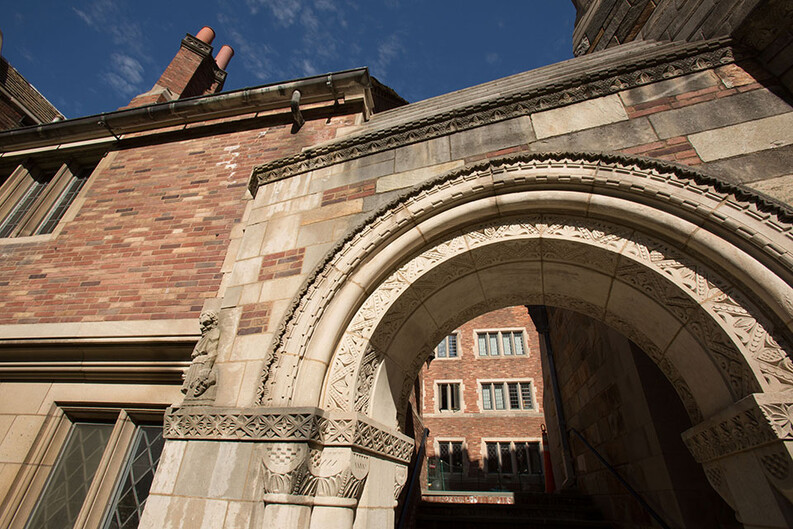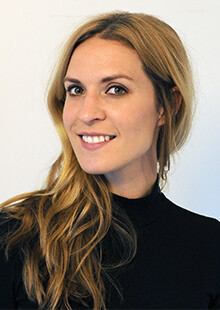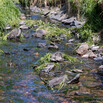Q&A: LEAP Student Fellow Emma Findlen LeBlanc ’24

Emma Findlen LeBlanc ’24 is a Law, Ethics & Animals Program (LEAP) student fellow who studies evolving legal formulations of personhood, especially their relation to rights, citizenship, standing, and property. She studied anthropology as a Rhodes Scholar at Oxford and is currently writing a book about poor Acadian forest communities in New Brunswick, Canada, with a particular focus on the impact of the communities’ moral relationship with animals and trees. LEAP Program Fellow Noah Macey spoke with LeBlanc about how her anthropological research in Canada affects her approach to animal law. Their conversation has been edited for clarity.
Could you give an overview of your work on forest communities in Canada?
I came to my research in Canada out of an interest in self-determination and local democracy. I wanted to understand self-determination in conditions of exploitation, and I was interested specifically in how these rural Acadian forest workers were trying to live outside of and against capitalist moral structures in conditions of extreme neoliberalism. I quickly discovered that the community I was studying understood itself as broader than its human members, so there was no way of understanding these anti-capitalist social structures without taking account of their interspecies ethical relationships with the trees, with the moose, and so on.
The community that I was writing about is ultimately structured around a distinction between insiders and outsiders. The insider sphere is fiercely egalitarian; it’s organized around care, around sharing all the resources you have, and it is intentionally and explicitly anti-capitalist. In interactions with the outsider sphere, there’s a sense that you should do whatever it takes to appropriate resources from the outsider sphere and distribute them amongst insiders. Whether that’s scheming or stealing, there’s a baseline understanding that the power dynamic is imbalanced, so it’s acceptable to do whatever you need to do.
But within the insider sphere, this sphere of egalitarianism, the spirit of mutual care was understood in these fundamentally interspecies ways. There is a real sense that the forest takes care of the Acadian people, and in response the Acadian people take care of the forest. So I totally had to shift how I was thinking about autonomy and community.

How did you first hear about this community and come to do fieldwork there?
I was in a village called Kedgwick, and I think Kedgwick epitomizes these values, partly because it’s so isolated and so thoroughly dominated by the forestry industry, which is what I was interested in. But I think there are elements of these values throughout Acadian communities in New Brunswick. My family is from New Brunswick — we’re Acadian — and I came to this research visiting my aunt and uncle. I was actually on my way to do fieldwork in Kyrgyzstan and got completely derailed. While I was visiting them, a secret forestry agreement between the New Brunswick government and J.D. Irving was leaked to the public. (J.D. Irving is the big forestry company that dominates the province.) There was a massive public outcry about this, people saying that this was one step too far, and at the time a lot of New Brunswick were calling the province anti-democratic. They were insisting that they didn’t live in a democracy.
I was coming from Syria, where I had been living and doing research, and I was sort of shocked because this was during the early years of the Syrian civil war, and Syrians were dying to live in a democracy like Canada, like New Brunswick. So I was sort of thrown off at first — what do you mean this isn’t democracy? So that was my initial question, how I got started. People there describe themselves as living in the Irving Empire. There’s a book called Citizens Irving. You have essentially one private, family-owned conglomerate that runs the province like an old company town, but on a provincial scale.
What sort of things did you see in Kedgwick that constituted these efforts at interspecies ethics and life outside the capitalist moral structures?
There are two pieces to it. One is the insider-sphere behaviors, and the other is engagement with the outsider sphere. Insider-sphere behaviors include this absolute disavowal of amassing any kind of personal wealth. Anything you have, you share. This includes behaviors that are protective of the forest and of non-humans as well. The ethics of mutual care extends to the forest. In interactions with the outsider sphere, there is a kind of lawlessness, doing what needs to be done, and that includes actions on behalf of the forest too — various ways of thwarting industrial forestry, whether that means messing with Irving truck drivers over the CB radios or sabotaging equipment.
I focused on where these Acadian values came into tension with the pressures of neoliberalism. For example, there was a real generational divide in whether people characterized the forest as an insider or not. The older generation was pretty adamant about the ethical relationship with the forest, which would play out in big and small ways. You might have a man in his 60s getting upset with his son, who’s sort of profligate about cutting down trees. Let’s say he goes to cut down a Christmas tree and decides it’s not perfect, so he cuts down another one, and so on. That’s seen as not just wasteful, it’s seen as a kind of violence. The same goes for massive industrial clear cuts. People walk through these clear cuts and describe the trees as sort of fallen family members.
On the other hand, you have a younger generation, especially men who are working for the forestry companies, and they’re actually doing these clear cuts — they’re perpetrating this. How do they do this as good Acadians? How do they maintain the values? You see a process of recharacterization: if the trees are not insiders, if they’re in fact outsiders, you can do anything. That’s the whole point of the outsider sphere. And so you see real tension around how different individuals or groups of individuals are categorized to maintain the insider and outsider spheres that are so essential to survival. I’m interested in the ways capitalist structures, neoliberal structures, and other regimes of power contain political challenges and defeat them on their own terms. These big machines came to mediate the interspecies ethical relationships that I saw playing out in New Brunswick.
You’ve been doing a fair amount of animal scholarship at law school. How has your experience in New Brunswick influenced your thinking about animal and environmental law?
There are a lot of animal law issues I’m interested in, but one of the hot topics in the field is legal personhood. And understandably so — it’s really hard to get the kinds of animal rights that so many of us want without personhood, so there’s a lot at stake here. But it’s hard, the status quo is entrenched, it hasn’t been successful in the courts, and even within academia it runs up against some theoretical problems and has remained pretty fringe. It’s still important and promising, and I think anthropology, where we problematize personhood all the time, is quite valuable.
Lots of personhood conversations in animal law start by underscoring the moral stakes. We start with the moral argument for why animals should be treated as persons. Something my research in New Brunswick attuned me to is the ways in which we already treat animals as moral persons all the time, in our everyday lives, like how we respond to wild animals in distress, or how we engage with our companion animals. So the real question is actually: what work is happening that severs our everyday moral relationships from the legal regimes in which we live? How is that work happening, why is that work happening, what are the processes by which that kind of violence happens?
In a sense, it’s pretty undemocratic. Starting from that point opens up new possibilities for thinking about personhood — including maybe its limitations, but also its possibilities and how we access them. That’s how I orient towards that topic. In law, we like categories, and personhood is one that we often talk about in these monolithic ways, whereas anthropologists have a pretty flexible understanding of how personhood can be contextual, how there can be degrees of personhood, how personhood is performed collectively. Trying to disentangle those nuances a bit in the law might help us come to a more rigorous definition of personhood and a more rigorous way of applying it, which could be more successful than simply making the moral case.
The other legal world I’m immersed in is reproductive justice, and I think it’s a promising field to be in dialogue with animal law because both are getting at some of the hardest theoretical questions, and they sometimes conflict. For example, in animal law we’re thinking about the possibilities that personhood entails, but in the reproductive justice space, the specter of fetal personhood limits possibilities for pregnant people. Having to reconcile those things forces us to engage in more rigorous thinking.
How else do you think your background in anthropology has sensitized you to law differently, or changed the way you think about our cultural relationship to nonhuman animals?
One of the great advantages of anthropological thinking is that it doesn’t take anything for granted—there are no assumptions about what humans are or can be. That openness to possibility can be a real asset in the law, where sometimes we can get so in the weeds and where possibilities seem so narrow. To know that humans can live in any arrangement we choose, that we in fact do so across the world, to know that this is only one arrangement and that so many others are possible—to know that in a field like animal law, where the battles are very much uphill and there are so many of them, is a source of optimism.
Appreciation of all the other ways people live in relation to animals and ecosystems illuminates the ways our systems in this country are violent and require a kind of violence to uphold. It challenges them as a sort of natural default and raises questions. In order for us to eat meat produced in industrial animal agriculture, a lot of work must be done to make it morally palatable. Some of that work is done by the law, some of it is done elsewhere. Understanding that shifts what we do, because it changes the project from “How do we get people to care?” to “How do we challenge the structures that limit, contain, and depoliticize certain kinds of caring?”
Introducing that element of choice is important. I think our legal structures are so deeply ingrained and often seem so powerful that one of the major obstacles to progress is being able to see beyond them, not just within them.


